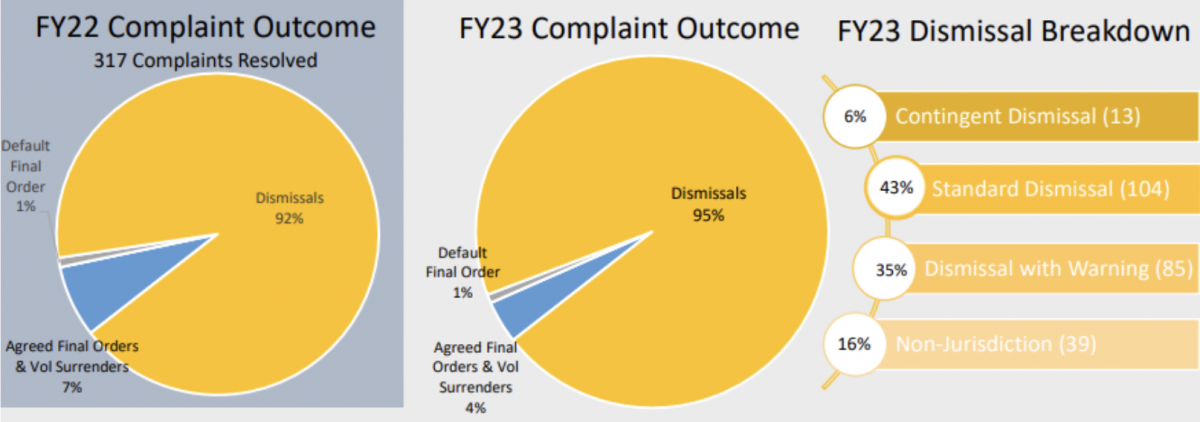In the last four pages of the Texas Appraiser Licensing & Certification Board’s (TALCB) staff reports is the section on enforcement. For fiscal year 2023 (July ’22–July ’23) less than four percent of license holders were the subject of a formal complaint filed with the Board, less than one percent of license holders received formal discipline, and typically more than 90 percent of complaints received are dismissed.

The following is an overview of TALCB’S formal complaint process including what constitutes a complaint that the Board can accept and how to properly submit. Also, the types of discipline TALCB may impose and under what circumstances.
Who Does TALCB Regulate?
The Board regulates professional appraisal service providers in Texas, including:
- Certified General Appraisers
- Certified Residential Appraisers
- Licensed Residential Appraisers
- Appraiser Trainees
- Appraiser Continuing Education Providers
- Temporary Practice Permits
- Appraisal Management Companies
The Board does not:
- Mediate value disputes
- Regulate property tax
- Address business practice issues
- Regulate broker price opinions
- Regulate evaluations
Basic Complaint Requirements
To investigate a complaint, the Board must have:
- a signed complaint
- jurisdiction
- probable cause to believe that a violation exists.
- alleged violation must have occurred within the previous four years.
A complaint must be signed because the Board cannot investigate anonymous complaints. The complaint must contain sufficient allegations of conduct that if true, would be a violation of the laws the Board enforces.
What if TALCB Does Not Have Jurisdiction?
Complaints regarding matters outside the jurisdiction of TALCB are closed. For example, complaints solely disputing value or relating to business practices do not fall under the Board’s jurisdiction. Staff may request additional information from any person, if necessary, to determine how to proceed with a complaint resolution.
Filing Complaints
Complaints must be submitted in writing. Complaints and supporting documents can be submitted through TALCB’s Online Complaint Portal.
All complaints received by TALCB are assigned a complaint number and are then reviewed for basic requirements through the complaint intake process.
Opening A Complaint
If the complaint and supporting documents meet all the basic requirements, the complaint is opened for investigation.
The “respondent” is the person(s) who is (are) the subject(s) of the complaint. If the respondent is a TALCB license holder, TALCB will send notice of the complaint to the respondent’s e-mail address on file. Each respondent must submit a response within 20 days of receiving notice of the complaint (that time period may be extended for good cause upon request). Once a response is received, the case manager will assign the complaint to an investigator.
Complaint Investigation
The Board prioritizes complaints based on the risk of harm each complaint poses to the public. Complaints that pose a high risk of public harm include violations of the Texas Appraiser Licensing and Certification Act or Board Rules that:
- evidence serious deficiencies, including:
- Fraud
- Identity theft
- Unlicensed activity
- Ethical violations
- Violations of appraiser independence
- other conduct determined by the Board to pose a significant risk of public harm.
- were done:
- with knowledge
- deliberately
- willfully
- with gross negligence.
Non-Disciplinary Dismissals
The complaint may be dismissed if the investigation shows that: the incident is outside the jurisdiction of the Board; no violation occurred; there is insufficient evidence to prove a violation occurred; or the complaint involves first- or second-time minor deficiencies.
Dismissal with Non-Disciplinary Warning Letter
If the investigation uncovers minor deficiencies that warrant a warning, the investigator will prepare a written summary of the case that includes the allegations, the response to the allegations, the investigator’s findings, and the investigator’s recommendation for resolution.
Warning letters can be used as evidence if a similar situation arises in the future.
Contingent Dismissal
A contingent dismissal is available for minor and serious deficiencies if the respondent has no prior formal discipline.
If the investigator finds that the identified deficiencies can be remedied through education or mentorship, the investigator will include the recommendation in the disposition factor analysis worksheet.
Once the investigation is complete, the complaint is referred to the Board’s legal staff for review. The staff attorney will review the complaint file and conduct a legal analysis to determine if disposition through contingent dismissal is appropriate.
Formal Disciplinary Action
If the investigation uncovers minor deficiencies coupled with certain aggravating circumstances or serious deficiencies, the investigator may recommend formal discipline to include any of the below sanctions to resolve the compliant:
- Remedial measures
- Required adoption of written preventative policies or procedures
- Probationary period with provisions for monitoring an appraiser’s practice.
- Restrictions on supervising trainees
- Restrictions on scope of practice
- Administrative penalty
- Refund
- Period of license suspension
- License revocation
Formal disciplinary actions are resolved through Agreed Orders or through an order from the Board after a hearing at the State Office of Administrative Hearings (SOAH).
Agreed Final Order
An Agreed Final Order is entered when the respondent and the Board agree to specific disciplinary action to resolve the case.
Proposal for Decision—SOAH Hearing
If the Board and the respondent cannot reach an agreed resolution, the staff attorney will draft and file a Statement of Charges with SOAH and request a hearing to be scheduled. SOAH typically sets a hearing date 30-90 days from the date of the hearing request. Once the hearing is scheduled, TALCB sends a Notice of Administrative Hearing to the respondent. Hearings are held before an administrative law judge.
Much of this information and more can be found in TALCB’s Complaint Overview Handbook.

